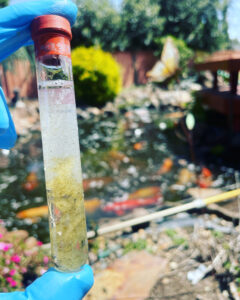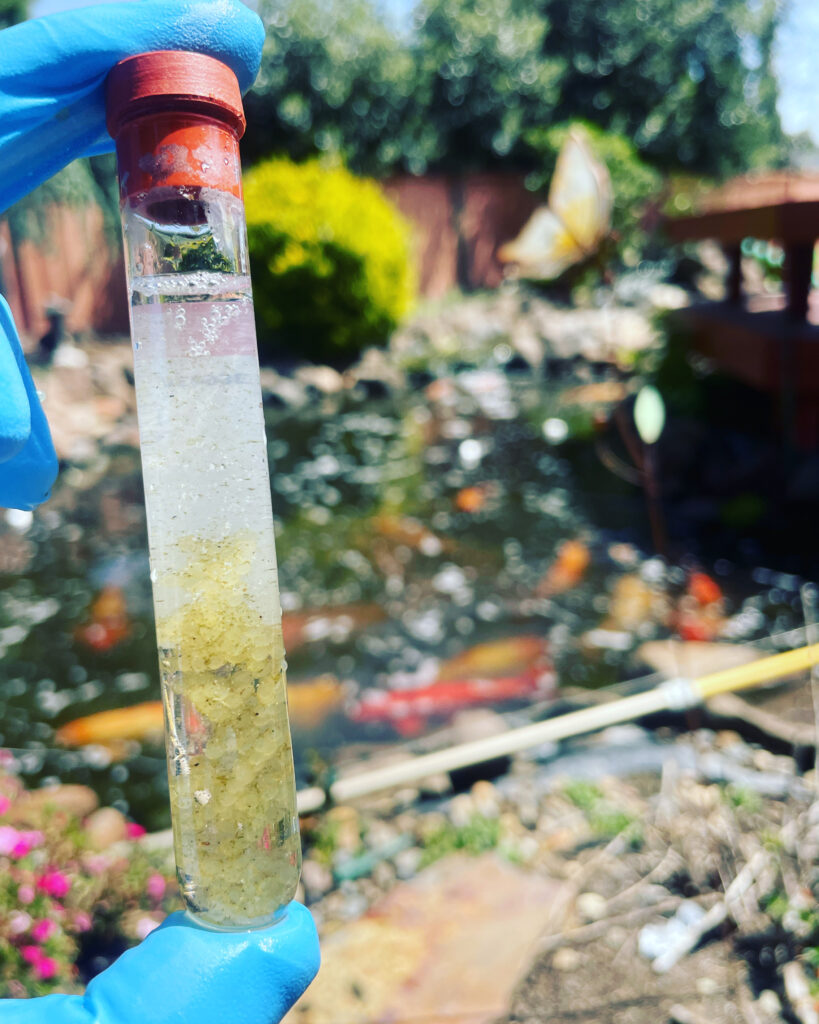Koi spawning is the technical name for koi reproduction or breeding. Provided you have the extra space, and at least one mature male and female koi, there is no reason you cannot try to spawn your koi. Even if you follow all of our suggestions, there is no guarantee that your fish will spawn. Some fish are just picky, but we think it’s because they know something we don’t. If your fish just refuse to spawn, it’s probably for the best.
Koi Spawning Specifics
The journey to spawn your koi starts with a simple koi reproductive lecture. Koi, like many other fish, including all their carp cousins, are external fertilizers. Basically, it’s a free-for-all with all the females and males spraying their products (eggs and sperm) into the water. It can be a rather aggressive process, wherein the males will chase the females, push them into the sides of the pond and even chase them out of the pond.
If your fish are more laid back about spawning, and all you may notice is some extra foam on the water when you check in on them. Typically, fish require a sudden warming of the water, such as in late spring or summer, to stimulate their need to spawn.

Reproductive Products (Eggs & Sperm) are Nutrient Expensive
Mature, female koi may have up to half of their body mass dedicated to their bilateral ovaries. This takes considerable energy and nutrient resources to produce. You will need to feed your koi and higher protein and fat diet and make sure your water chemistry is pristine. The larger the koi, the more oxygen its body and egg mass will require, so more water movement across the gills equals more exposure to any potential water quality problems.
Give the Eggs a Place to Land
If you subscribe to the “traditional” koi pond with straight sides and no plants, do not expect your koi to spawn. Without a safe place for the eggs to land, your females are not likely to waste their time. Ponds with plants will likely see their carefully aquascaped pond ripped apart by rollicking koi. Koi love using plant roots to lay their eggs and will likely cause significant destruction in the process. The outer membrane of koi eggs are VERY sticky so they will adhere to almost every surface (including our exam buckets!).
If you do not have plants in your pond and want to try to entice your koi to spawn, you may want to try spawning brushes. These are essentially very large pip cleaners with lots of bristles to catch koi eggs. Hang them at the surface of your pond or sink them so they lay across the bottom. Your koi might not quite understand what these are and take some time to get used to them.
Successfully Raising Koi Babies
After your koi have laid their eggs and fertilized them, if you want any babies to survive, you need to move them out of the pond. If left in the pond with their hungry parents, they will get eaten. This is a completely normal process and will allow your adult koi to regain some of the energy they expended during spawning. If you do not have room for additional koi in your pond and they spawn, allow them to eat all the eggs.
Remove your egg-covered plants or spawning brushes to a nursery tank. You will need to keep the water clean and warm and in a few days, your koi babies, known as “fry,” will start to emerge and swim. They will consume their attached yolk sac first and then be VERY hungry. It is essential that you feed your koi babies a protein and fat rich diet in order to promote correct development, in addition to keeping their water quality within range.
Koi Spawning Water Quality Issues
The release of eggs and sperm into your koi pond can have a serious impact on your water quality. Both eggs and sperm are high protein products, which will break down into ammonia. You will likely see a small spike in your ammonia right after spawning, but as long as your filters are working well, it will be transient and not affect your fish.
Troubleshooting Koi Spawning
Giving your fish lots of extra calories, have excellent, warm water and lots of places for eggs to land? Sometimes, fish with underlying health issues may be using the additional calories to stay healthy, rather than make more fish. Your local aquatic veterinarian should do an assessment to ensure your fish are healthy enough to spawn and that you actually have enough room in the pond for more fish.

